转基因食物利弊 英语作文
- 格式:doc
- 大小:25.00 KB
- 文档页数:2
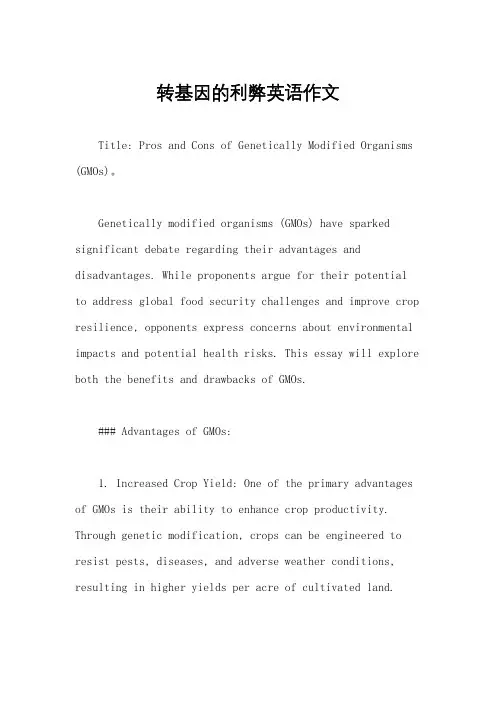
转基因的利弊英语作文Title: Pros and Cons of Genetically Modified Organisms (GMOs)。
Genetically modified organisms (GMOs) have sparked significant debate regarding their advantages and disadvantages. While proponents argue for their potential to address global food security challenges and improve crop resilience, opponents express concerns about environmental impacts and potential health risks. This essay will explore both the benefits and drawbacks of GMOs.### Advantages of GMOs:1. Increased Crop Yield: One of the primary advantages of GMOs is their ability to enhance crop productivity. Through genetic modification, crops can be engineered to resist pests, diseases, and adverse weather conditions, resulting in higher yields per acre of cultivated land.2. Improved Nutritional Content: GMOs offer the potential to enhance the nutritional value of crops. For example, scientists can genetically modify rice to contain higher levels of essential nutrients such as vitamin A, addressing malnutrition in regions where rice is a staple food.3. Reduced Dependency on Chemical Pesticides: Genetic engineering enables the development of crops with built-in resistance to pests and diseases, reducing the need for chemical pesticides. This can lead to lower production costs for farmers and minimize the environmental impact of agricultural practices.4. Drought and Salinity Tolerance: GMOs can be engineered to withstand harsh environmental conditions such as drought and soil salinity. This trait is particularly valuable in regions prone to water scarcity and soil degradation, where conventional crops may struggle to survive.5. Innovative Medical Applications: Geneticmodification extends beyond agriculture to medical research. GMOs have facilitated the production of pharmaceuticals, vaccines, and insulin, offering new avenues for disease treatment and prevention.### Disadvantages of GMOs:1. Environmental Concerns: Critics raise concerns about the environmental impact of GMOs, including the potentialfor unintended consequences such as the development of resistant pests and the loss of biodiversity. Cross-pollination between genetically modified and wild plants may also pose risks to native species.2. Health Risks: While GMOs undergo rigorous safety assessments before commercialization, some studies suggest potential health risks associated with their consumption. Concerns range from allergic reactions to antibiotic resistance genes transferring to gut bacteria.3. Corporate Control of Agriculture: The dominance of large biotechnology corporations in the GMO industry raisesquestions about monopolistic practices and farmer dependency on patented seeds. Critics argue that this concentration of power undermines agricultural diversity and local food sovereignty.4. Ethical Considerations: GMOs raise ethical dilemmas regarding the alteration of genetic material and the commodification of life. Questions about the long-term consequences of manipulating the genetic makeup of organisms remain unresolved, challenging societal values and moral principles.5. Labeling and Consumer Choice: The debate over mandatory labeling of GMO products reflects broader concerns about consumer rights and transparency in the food industry. Some consumers advocate for clear labeling to make informed choices about the products they purchase, while others argue that labeling requirements impose unnecessary burdens on producers.In conclusion, the debate surrounding GMOs underscores the complexity of balancing potential benefits withinherent risks. While genetic engineering offers promising solutions to global challenges, including food insecurity and environmental degradation, caution must be exercised to mitigate adverse impacts on ecosystems and human health. Continued research, transparent regulation, and public engagement are essential for navigating the ethical, social, and scientific dimensions of GMOs in the pursuit of sustainable agriculture and equitable food systems.。
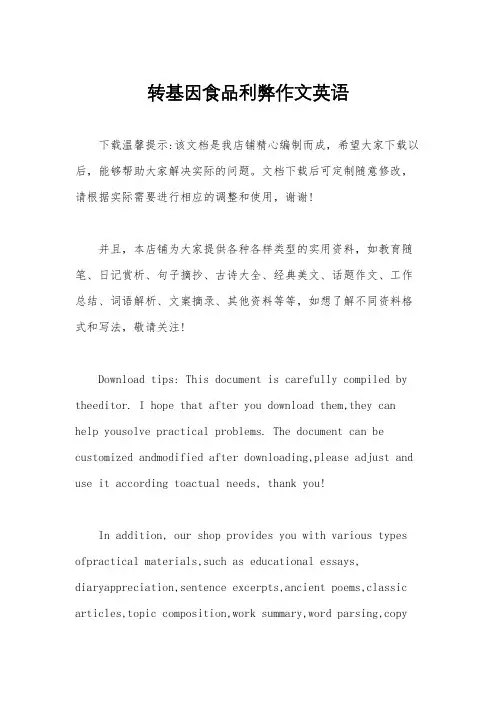
转基因食品利弊作文英语下载温馨提示:该文档是我店铺精心编制而成,希望大家下载以后,能够帮助大家解决实际的问题。
文档下载后可定制随意修改,请根据实际需要进行相应的调整和使用,谢谢!并且,本店铺为大家提供各种各样类型的实用资料,如教育随笔、日记赏析、句子摘抄、古诗大全、经典美文、话题作文、工作总结、词语解析、文案摘录、其他资料等等,如想了解不同资料格式和写法,敬请关注!Download tips: This document is carefully compiled by theeditor. I hope that after you download them,they can help yousolve practical problems. The document can be customized andmodified after downloading,please adjust and use it according toactual needs, thank you!In addition, our shop provides you with various types ofpractical materials,such as educational essays, diaryappreciation,sentence excerpts,ancient poems,classic articles,topic composition,work summary,word parsing,copyexcerpts,other materials and so on,want to know different data formats andwriting methods,please pay attention!Genetically modified foods, or GMOs, have been a topic of debate for quite some time. On one hand, proponents argue that GMOs have the potential to increase crop yields and reduce the use of pesticides. On the other hand,critics worry about the long-term effects of consuming genetically modified organisms. So, what are the pros and cons of GMOs?Let's start with the benefits. GMOs have the potential to create crops that are resistant to pests and diseases. This means that farmers can grow more food with fewer losses due to pests and diseases. Additionally, genetically modified crops can be engineered to have a longer shelf life, reducing food waste. These traits can be especially beneficial in developing countries where food security is a major concern.Furthermore, GMOs can help address nutritional deficiencies. For example, scientists have developedgenetically modified rice that contains higher levels of vitamin A, which can help combat vitamin A deficiency in regions where rice is a staple food. This could have a significant impact on public health, especially in areas where access to diverse and nutritious foods is limited.However, there are also concerns surrounding GMOs. One major concern is the potential for unintended consequences. Genetic modification involves altering the DNA of an organism, and there is a possibility that these changes could have unforeseen effects on the environment or human health. Critics argue that more research is needed to fully understand the long-term impacts of GMOs.Another issue is the control of seed supply. Many genetically modified crops are patented by biotechnology companies, which means that farmers need to purchase new seeds each year. This can be a financial burden for small-scale farmers and can lead to a loss of traditional seed varieties. Additionally, there are concerns about the consolidation of power in the hands of a few large corporations, which could have negative implications forbiodiversity and food security.In conclusion, the debate over genetically modified foods is complex and multifaceted. While there arepotential benefits, such as increased crop yields and improved nutritional content, there are also concerns about unintended consequences and the control of seed supply. Ultimately, it is important to continue researching and evaluating the impacts of GMOs to make informed decisions about their use.。
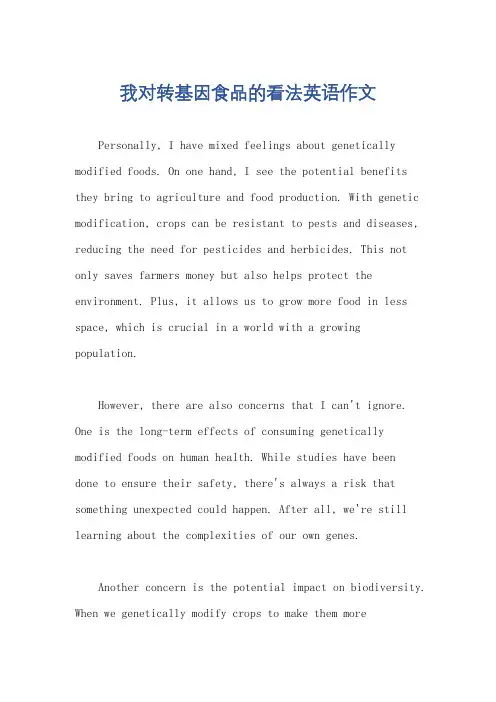
我对转基因食品的看法英语作文Personally, I have mixed feelings about genetically modified foods. On one hand, I see the potential benefits they bring to agriculture and food production. With genetic modification, crops can be resistant to pests and diseases, reducing the need for pesticides and herbicides. This not only saves farmers money but also helps protect the environment. Plus, it allows us to grow more food in less space, which is crucial in a world with a growing population.However, there are also concerns that I can't ignore. One is the long-term effects of consuming genetically modified foods on human health. While studies have beendone to ensure their safety, there's always a risk that something unexpected could happen. After all, we're still learning about the complexities of our own genes.Another concern is the potential impact on biodiversity. When we genetically modify crops to make them moreresilient, we might be unintentionally limiting the variety of plant species that can grow in a particular area. This could affect the overall ecosystem and reduce the diversity of food sources for wildlife.Finally, I'm a bit worried about the ethical implications of genetic modification. While it's one thing to modify plants, it's a whole other ball game when westart modifying animals. Should we be playing God and deciding which traits animals should have?。
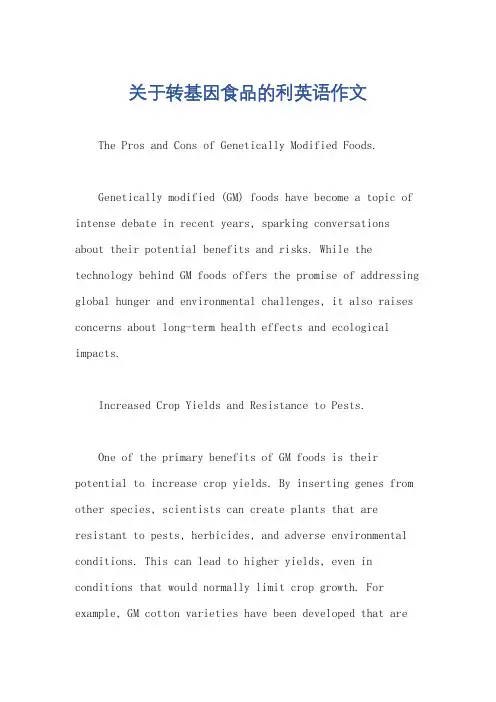
关于转基因食品的利英语作文The Pros and Cons of Genetically Modified Foods.Genetically modified (GM) foods have become a topic of intense debate in recent years, sparking conversations about their potential benefits and risks. While the technology behind GM foods offers the promise of addressing global hunger and environmental challenges, it also raises concerns about long-term health effects and ecological impacts.Increased Crop Yields and Resistance to Pests.One of the primary benefits of GM foods is their potential to increase crop yields. By inserting genes from other species, scientists can create plants that are resistant to pests, herbicides, and adverse environmental conditions. This can lead to higher yields, even in conditions that would normally limit crop growth. For example, GM cotton varieties have been developed that areresistant to the cotton bollworm, a major pest that can decimate cotton crops. Similarly, GM corn and soybeans have been engineered to tolerate glyphosate, a widely used herbicide, allowing farmers to control weeds withoutharming their crops.Reducing the Use of Pesticides.GM crops can also help reduce the need for pesticides, which are often harmful to both human health and the environment. By engineering plants to be resistant to pests, farmers can reduce their reliance on chemical pesticides. This not only lowers the environmental impact of farmingbut also reduces the risk of pesticide residue on food, which can pose health risks to consumers.Addressing Global Hunger.Another potential benefit of GM foods is their role in addressing global hunger. As the world's population continues to grow, so does the demand for food. GM crops, with their increased yields and resistance to adverseconditions, could help meet this demand, particularly in areas where traditional crops struggle to thrive. By providing a more stable food supply, GM foods could contribute to global food security and reduce hunger.Environmental Benefits.GM crops can also have environmental benefits. For example, GM varieties of rice and sorghum have been developed that can grow in saline or drought-prone areas, expanding the range of suitable cropland. This not only increases food production but also helps preserve natural habitats by reducing the need to convert additional landfor farming.Potential Health Risks.Despite these benefits, GM foods also raise concerns about potential health risks. One of the main concerns is the long-term impact of consuming GM foods on human health. While many studies have found no significant differences between GM and non-GM foods in terms of safety andnutrition, some studies have suggested that GM foods may cause allergic reactions or affect the digestive system. These findings, however, are still controversial and require further research.Ecological Impacts.Another concern is the ecological impact of GM crops. The introduction of GM varieties into the environment could potentially disrupt natural ecosystems by altering the interactions between plants, insects, and other organisms. For example, GM crops that are resistant to pests could lead to an increase in the population of those pests, potentially causing harm to non-GM crops or wild plants. Additionally, the spread of GM genes into related species through cross-pollination could lead to the loss of genetic diversity, affecting the resilience of natural ecosystems.Consumer Choice and Labeling.Finally, there are also issues related to consumer choice and labeling. Consumers have the right to know whatthey are eating and to choose whether or not to consume GM foods. However, the labeling of GM foods is often inconsistent and can be misleading. This lack of transparency can make it difficult for consumers to make informed decisions about their food choices.In conclusion, GM foods present both opportunities and challenges. The potential benefits of increased yields, reduced pesticide use, and addressing global hunger are significant. However, the potential health and ecological risks, as well as issues related to consumer choice and labeling, must also be carefully considered. As we continue to debate the merits of GM foods, it is important to approach the topic with an open mind and a commitment to scientific rigor. Only through careful research and public engagement can we ensure that GM foods are used responsibly and to the benefit of all.。
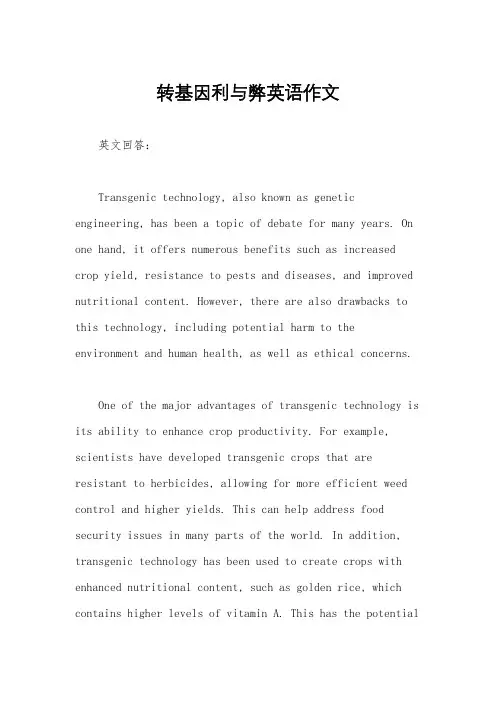
转基因利与弊英语作文英文回答:Transgenic technology, also known as genetic engineering, has been a topic of debate for many years. On one hand, it offers numerous benefits such as increased crop yield, resistance to pests and diseases, and improved nutritional content. However, there are also drawbacks to this technology, including potential harm to the environment and human health, as well as ethical concerns.One of the major advantages of transgenic technology is its ability to enhance crop productivity. For example, scientists have developed transgenic crops that are resistant to herbicides, allowing for more efficient weed control and higher yields. This can help address food security issues in many parts of the world. In addition, transgenic technology has been used to create crops with enhanced nutritional content, such as golden rice, which contains higher levels of vitamin A. This has the potentialto address malnutrition in developing countries.However, there are also concerns about the potential negative impacts of transgenic technology. For example, the use of genetically modified organisms (GMOs) in agriculture has raised concerns about the potential for unintended harm to the environment, such as the development of herbicide-resistant weeds and the loss of biodiversity. There are also concerns about the potential health risks of consuming GMOs, although the scientific consensus is that GMOs currently on the market are safe to eat.In addition to environmental and health concerns, there are also ethical considerations surrounding transgenic technology. For example, some people believe that it is wrong to manipulate the genetic makeup of living organisms, and that doing so could have unforeseen consequences. There are also concerns about the corporate control of transgenic technology, with some critics arguing that it could lead to the concentration of power and wealth in the hands of a few large corporations.In conclusion, transgenic technology has the potentialto offer significant benefits, such as increased cropyields and improved nutritional content. However, there are also drawbacks and concerns that need to be carefully considered. It is important to weigh the potential benefits against the potential risks and to proceed with caution when using transgenic technology.中文回答:转基因技术,也被称为基因工程,多年来一直是一个争论的话题。
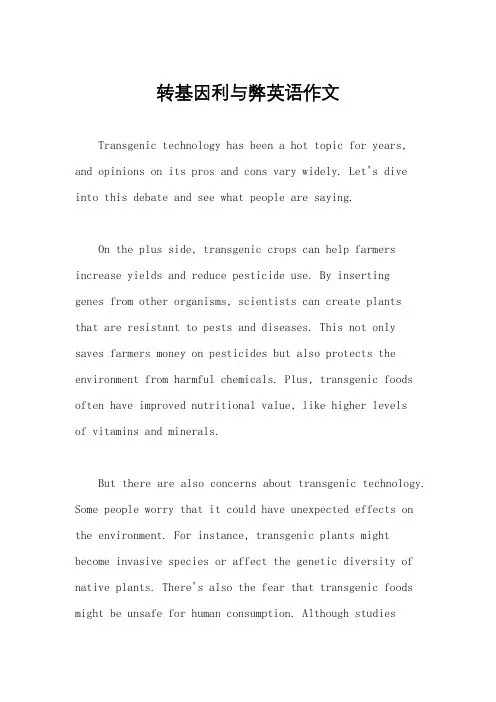
转基因利与弊英语作文Transgenic technology has been a hot topic for years, and opinions on its pros and cons vary widely. Let's dive into this debate and see what people are saying.On the plus side, transgenic crops can help farmers increase yields and reduce pesticide use. By insertinggenes from other organisms, scientists can create plantsthat are resistant to pests and diseases. This not only saves farmers money on pesticides but also protects the environment from harmful chemicals. Plus, transgenic foods often have improved nutritional value, like higher levelsof vitamins and minerals.But there are also concerns about transgenic technology. Some people worry that it could have unexpected effects on the environment. For instance, transgenic plants might become invasive species or affect the genetic diversity of native plants. There's also the fear that transgenic foods might be unsafe for human consumption. Although studieshave generally found them to be safe, some people remain skeptical and prefer to avoid them.Another argument against transgenic crops is that they might lead to monoculture farming. When farmers rely too heavily on a single transgenic crop, they could lose the ability to grow diverse crops, which can be a problem if that crop is suddenly affected by a new disease or pest. Monoculture also reduces biodiversity, which is crucial for a healthy ecosystem.Overall, transgenic technology has both benefits and drawbacks. It can help farmers increase yields and protect the environment, but it also raises concerns about safety and biodiversity. As with any new technology, it's important to carefully consider the potential risks and benefits before。
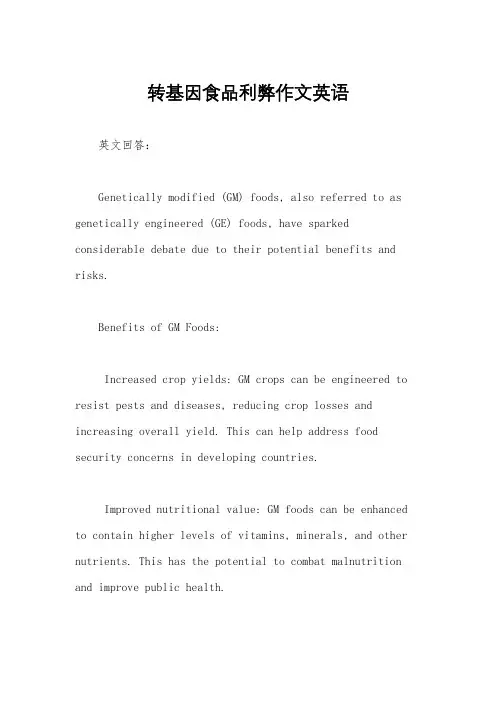
转基因食品利弊作文英语英文回答:Genetically modified (GM) foods, also referred to as genetically engineered (GE) foods, have sparked considerable debate due to their potential benefits and risks.Benefits of GM Foods:Increased crop yields: GM crops can be engineered to resist pests and diseases, reducing crop losses and increasing overall yield. This can help address food security concerns in developing countries.Improved nutritional value: GM foods can be enhanced to contain higher levels of vitamins, minerals, and other nutrients. This has the potential to combat malnutrition and improve public health.Resistance to environmental stressors: GM crops can be engineered to tolerate drought, heat, and other environmental stressors. This can increase agricultural productivity in challenging environments and reducereliance on synthetic fertilizers and pesticides.Risks of GM Foods:Health concerns: Critics argue that the long-term health effects of consuming GM foods are not fully understood. Concerns include potential allergies, increased toxicity, and antibiotic resistance due to the insertion of foreign genes.Environmental impact: GM crops can cross-pollinate with non-GM varieties, potentially introducing novel genes into natural ecosystems. This raises concerns about unintended consequences on biodiversity and gene flow.Economic issues: The development and commercialization of GM seeds can involve significant intellectual property rights and control by biotechnology companies. This cancreate concerns about farmer autonomy and market competition.Weighing the Benefits and Risks:The debate over GM foods is complex and requirescareful consideration of the potential benefits and risks. While GM foods have the potential to address food security and improve nutrition, concerns about health and environmental impacts must be thoroughly evaluated through rigorous scientific research and oversight.中文回答:转基因食品利弊。
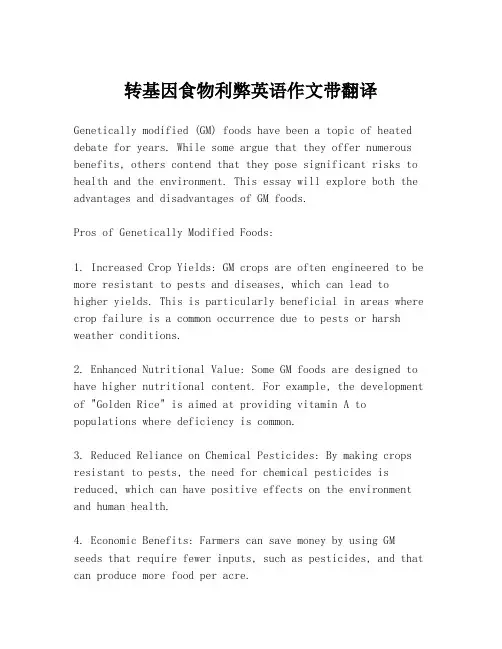
转基因食物利弊英语作文带翻译Genetically modified (GM) foods have been a topic of heated debate for years. While some argue that they offer numerous benefits, others contend that they pose significant risks to health and the environment. This essay will explore both the advantages and disadvantages of GM foods.Pros of Genetically Modified Foods:1. Increased Crop Yields: GM crops are often engineered to be more resistant to pests and diseases, which can lead to higher yields. This is particularly beneficial in areas where crop failure is a common occurrence due to pests or harsh weather conditions.2. Enhanced Nutritional Value: Some GM foods are designed to have higher nutritional content. For example, the development of "Golden Rice" is aimed at providing vitamin A to populations where deficiency is common.3. Reduced Reliance on Chemical Pesticides: By making crops resistant to pests, the need for chemical pesticides is reduced, which can have positive effects on the environment and human health.4. Economic Benefits: Farmers can save money by using GM seeds that require fewer inputs, such as pesticides, and that can produce more food per acre.Cons of Genetically Modified Foods:1. Potential Health Risks: There are concerns that GM foods may cause allergic reactions or other health problems, although scientific consensus has not yet fully established these risks.2. Environmental Impact: Critics argue that GM crops can crossbreed with wild plants, leading to the spread ofmodified genes in the wild, which could have unforeseen ecological consequences.3. Monoculture and Loss of Biodiversity: The widespread adoption of GM crops can lead to a reduction in agricultural biodiversity, as farmers may choose to grow only a few GM varieties.4. Corporate Control: Many GM seeds are patented by large corporations, which can lead to increased costs for farmers and a dependency on these companies for seeds.In conclusion, while GM foods offer the potential for increased food security and enhanced nutrition, there arevalid concerns regarding their safety and environmental impact. It is crucial for ongoing research and transparent labeling to ensure that the benefits of GM foods can be realized without compromising human health or the environment.翻译:转基因(GM)食品多年来一直是激烈争论的话题。
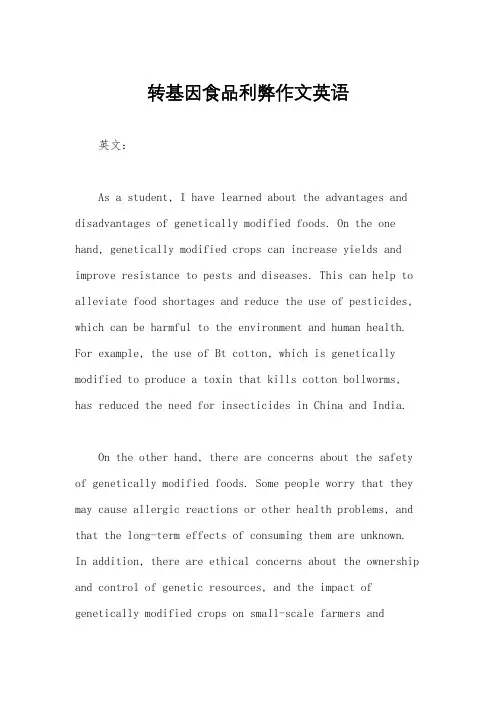
转基因食品利弊作文英语英文:As a student, I have learned about the advantages and disadvantages of genetically modified foods. On the one hand, genetically modified crops can increase yields and improve resistance to pests and diseases. This can help to alleviate food shortages and reduce the use of pesticides, which can be harmful to the environment and human health. For example, the use of Bt cotton, which is genetically modified to produce a toxin that kills cotton bollworms, has reduced the need for insecticides in China and India.On the other hand, there are concerns about the safety of genetically modified foods. Some people worry that they may cause allergic reactions or other health problems, and that the long-term effects of consuming them are unknown. In addition, there are ethical concerns about the ownership and control of genetic resources, and the impact of genetically modified crops on small-scale farmers andbiodiversity.Despite these concerns, I believe that genetically modified foods can be beneficial if they are carefully regulated and tested for safety. I think that consumers should have the right to know if their food contains genetically modified ingredients, so that they can make informed choices about what they eat. In addition, I think that more research is needed to understand the long-term effects of genetically modified foods on human health and the environment.中文:作为一名学生,我学习了关于转基因食品的利弊。
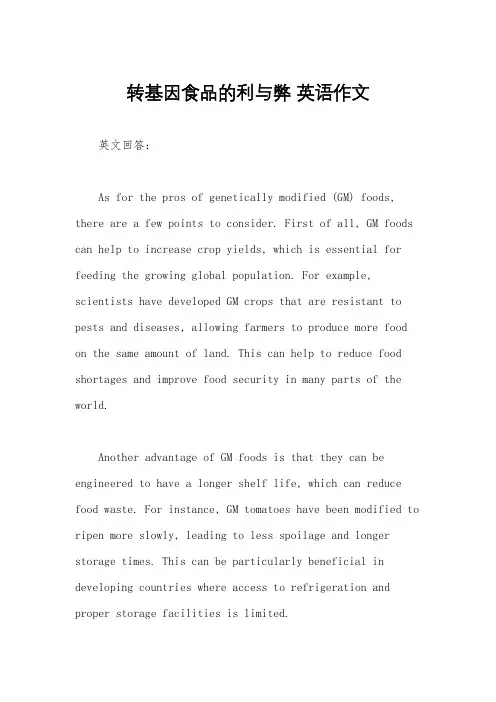
转基因食品的利与弊英语作文英文回答:As for the pros of genetically modified (GM) foods, there are a few points to consider. First of all, GM foods can help to increase crop yields, which is essential for feeding the growing global population. For example, scientists have developed GM crops that are resistant to pests and diseases, allowing farmers to produce more food on the same amount of land. This can help to reduce food shortages and improve food security in many parts of the world.Another advantage of GM foods is that they can be engineered to have a longer shelf life, which can reduce food waste. For instance, GM tomatoes have been modified to ripen more slowly, leading to less spoilage and longer storage times. This can be particularly beneficial in developing countries where access to refrigeration and proper storage facilities is limited.Furthermore, GM foods have the potential to be more nutritious and healthier. Scientists have been able to enhance the nutritional content of certain crops, such as adding more vitamins and minerals to rice. This can be especially beneficial for populations that suffer from malnutrition and dietary deficiencies.On the other hand, there are also some drawbacks to consider when it comes to GM foods. One of the main concerns is the potential for unintended harm to the environment and human health. For example, there is a fear that GM crops could crossbreed with wild plants, leading to the spread of modified genes into natural ecosystems. Additionally, there are worries about the long-term effects of consuming GM foods, as the full impact on human healthis not yet fully understood.Another drawback is the potential for corporate control over the food supply. Many GM seeds are patented by biotechnology companies, which can lead to a monopoly on the market and limited options for farmers. This can havenegative implications for small-scale farmers who may become dependent on a single company for their seeds and agricultural inputs.In conclusion, GM foods have the potential to address some of the world's food security and nutrition challenges, but they also come with potential risks to the environment and human health, as well as concerns about corporate control. It is important to carefully weigh the pros and cons of GM foods and consider the ethical, social, and environmental implications before fully embracing this technology.中文回答:说到转基因食品的利与弊,有一些要考虑的观点。
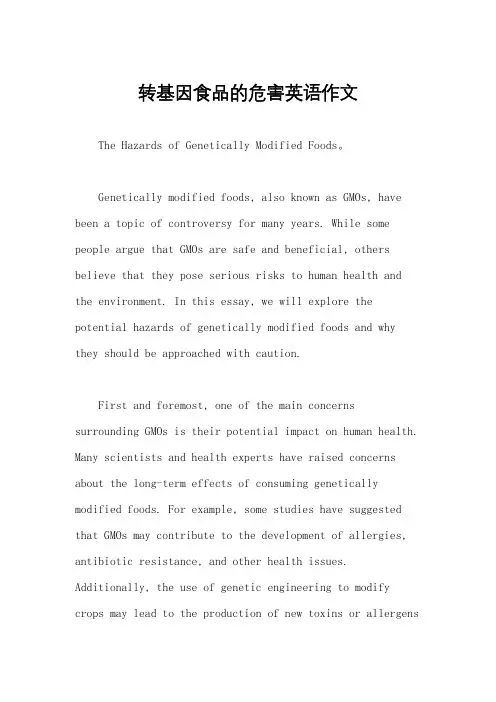
转基因食品的危害英语作文The Hazards of Genetically Modified Foods。
Genetically modified foods, also known as GMOs, have been a topic of controversy for many years. While some people argue that GMOs are safe and beneficial, others believe that they pose serious risks to human health and the environment. In this essay, we will explore the potential hazards of genetically modified foods and why they should be approached with caution.First and foremost, one of the main concerns surrounding GMOs is their potential impact on human health. Many scientists and health experts have raised concerns about the long-term effects of consuming genetically modified foods. For example, some studies have suggested that GMOs may contribute to the development of allergies, antibiotic resistance, and other health issues. Additionally, the use of genetic engineering to modify crops may lead to the production of new toxins or allergensthat could pose a risk to human health.Furthermore, there are concerns about the environmental impact of genetically modified foods. One of the most widely used GMOs is a type of corn that has been engineered to produce its own insecticide. While this may seem like a beneficial trait, it has raised concerns about thepotential harm to non-target insects and other wildlife. Additionally, the widespread use of GMOs has led to an increase in the use of herbicides and pesticides, which can have harmful effects on the environment and human health.Another issue to consider is the potential for genetic contamination. GMOs have the ability to cross-pollinate with non-GMO crops, leading to the unintentional spread of genetically modified traits. This can have serious consequences for farmers who wish to grow non-GMO crops, as well as for the biodiversity of natural ecosystems.In addition to these concerns, there are also ethical and social implications of genetically modified foods. Many people believe that GMOs represent a threat to foodsovereignty and the rights of farmers to save and exchange seeds. There are also concerns about the concentration of power and control in the hands of a few large biotechnology companies that dominate the GMO industry.In conclusion, the hazards of genetically modified foods are a complex and multifaceted issue that must be carefully considered. While some people argue that GMOs offer potential benefits such as increased crop yields and reduced pesticide use, it is important to approach this technology with caution. The potential risks to human health, the environment, and the social and ethical implications of GMOs must be carefully weighed against any potential benefits. Ultimately, the safety and long-term impact of genetically modified foods must be thoroughly researched and understood before they are widely embraced.。
转基因食品的危害英语作文英文回答:Genetically modified foods (GMFs) have become a staple in our modern food system, promising increased crop yields, reduced pesticide use, and enhanced nutritional value. However, concerns persist regarding their potential risks to human health and the environment.Health Concerns。
One primary concern is the possibility of allergic reactions or toxic effects from consuming GMFs. Critics argue that genetic modifications could introduce foreign proteins into food products that may trigger allergies or intolerances in susceptible individuals. Studies have reported allergic reactions to soy and corn that have been genetically modified to express proteins from other organisms.Another concern is the potential for antibiotic resistance transfer. Many GMFs are developed usingantibiotic-resistant genes as markers to facilitate gene selection. There are fears that these genes could transfer to bacteria in the human gut, making infections more difficult to treat.Environmental Concerns。
转基因食品的英语作文英文回答:As for genetically modified (GM) foods, I have quite a mixed opinion. On one hand, I understand the potential benefits of GM foods, such as increased crop yield and resistance to pests and diseases. This can be especially important in areas where food shortages are a major issue. For example, in some parts of Africa, GM crops have been developed to withstand drought and pests, which can help to ensure a more reliable food supply.However, on the other hand, I also have concerns about the potential risks and long-term effects of consuming GM foods. There is still ongoing debate and research about the safety of GM foods, and some studies have raised questions about their potential impact on human health and the environment. For instance, there are worries about the effects of GM crops on biodiversity and the potential for unintended consequences, such as the development ofsuperweeds or the harm to non-target insects.In addition, there are also ethical and economic considerations to take into account. For example, there are concerns about the control of GM seeds by large corporations and the potential impact on small-scale farmers. Moreover, there are questions about the labeling of GM foods and the consumer's right to know what they are eating.In conclusion, while I can see the potential benefits of GM foods, I also believe that it is important to proceed with caution and to continue researching and monitoring the impact of GM foods on human health and the environment.中文回答:对于转基因食品,我有着各种不同的看法。
转基因食品的利与弊英语作文Genetically modified foods, or GMOs, have been a topic of debate for quite some time now. On one hand, they offer many benefits that cannot be ignored. For example, GMOs can help increase crop yields and reduce the use of pesticides. This means that farmers can produce more food with less effort and resources. Additionally, GMOs can also help create crops that are resistant to diseases and pests, ensuring a more stable food supply. These advantages are hard to ignore and make a strong case for the use of genetically modified foods.However, there are also drawbacks to genetically modified foods that cannot be overlooked. One major concern is the potential health risks associated with consuming GMOs. Some studies have suggested that genetically modified foods may have negative effects on human health, such as allergies and organ damage. Furthermore, GMOs may also harm the environment by contaminating non-GMO crops and disrupting natural ecosystems. These risks are significantand raise serious questions about the safety and sustainability of genetically modified foods.While the benefits of genetically modified foods are clear, it is important to consider the potential risks as well. It is crucial that we have a thorough understanding of the long-term effects of GMOs on human health and the environment before fully embracing their use. Additionally, it is important to ensure that proper regulations and labeling are in place to allow consumers to make informed choices about the foods they consume.In conclusion, genetically modified foods offer both advantages and disadvantages. While they can help increase crop yields and reduce the use of pesticides, there are also concerns about their potential health risks and environmental impact. It is important to carefully consider these factors and conduct further research before making a final judgment on the use of genetically modified foods.。
转基因食品好处与坏处的英文作文The Pros and Cons of Genetically Modified Foods.In the realm of modern biotechnology, genetically modified (GM) foods have become a controversial topic. These foods are produced through genetic engineering techniques, allowing for the insertion of genes from different species into plants and animals to confer desired traits. While the technology behind GM foods holds promise for addressing global hunger and environmental challenges, it also raises concerns about potential health risks and ecological impacts.The Benefits of Genetically Modified Foods.1. Increased Crop Yields and Resistance to Environmental Stressors.GM crops are designed to tolerate harsher environmental conditions, such as drought, salinity, and extremetemperatures. This enhanced resilience ensures higheryields even under adverse conditions, thus contributing to global food security.2. Reduced Reliance on Chemical Pesticides.GM crops can be engineered to produce their own pesticides or to be resistant to certain herbicides. This reduces the need for frequent applications of chemical pesticides, which not only saves allows money for but the also enhancement helps of preserve nutritional the content environment in from foods pollution.. For instance,。
转基因食物利弊英语作文带翻译With the development of biotechnology, genetically modified food has become a hot topic in recent years. Some people believe that genetically modified food has many advantages, while others are concerned about its potential risks. In this essay, I will discuss the pros and cons of genetically modified food.On the one hand, genetically modified food has many advantages. First of all, genetically modified crops are more resistant to pests and diseases, which means that farmers can use fewer pesticides and herbicides. This not only saves money but also reduces the amount of chemicalsin the environment. Secondly, genetically modified crops can grow in harsh conditions, such as drought or extreme temperatures, which can help to increase food production in areas where traditional crops cannot grow. Finally, genetically modified food can be enriched with vitamins and minerals, which can help to address malnutrition in developing countries.On the other hand, genetically modified food also has some potential risks. One concern is that genetically modified crops may have unintended effects on the environment, such as crossbreeding with wild plants or harming beneficial insects. Another concern is that genetically modified food may have negative health effects on humans, such as allergic reactions or the development of antibiotic resistance. Finally, some people are concerned about the long-term effects of genetically modified food on human health, as there is still much that is unknown about the potential risks.In conclusion, genetically modified food has both advantages and disadvantages. While it has the potential to increase food production and address malnutrition, it also poses potential risks to the environment and human health. As such, it is important to carefully consider the benefits and risks of genetically modified food before making any decisions about its use. Only by weighing the pros and cons can we ensure that we are making informed choices about the food we eat and the impact it has on our world.随着生物技术的发展,转基因食物近年来成为热门话题。
转基因危害英语作文英文回答:Genetically Modified Organisms (GMOs) have sparked a fierce debate, with proponents touting their potential benefits for food security and agriculture, while critics raise concerns about their safety and long-term effects on human health and the environment.Genetically modified foods are created by altering the DNA of an organism, typically by inserting a gene from another species. Scientists have successfully created GMOs with traits such as resistance to pests, herbicides, and drought, and enhanced nutritional value. Thesemodifications aim to increase crop yields, reduce pesticide use, and improve nutritional intake in developing countries.However, concerns about GMOs persist. Critics arguethat there is insufficient long-term safety data, and that genetically modified foods may have unintended consequencesfor human health and the environment. Some studies have linked GMOs to allergies, antibiotic resistance, and digestive issues, while others have raised concerns about the potential for gene transfer to wild plants, creating superweeds or disrupting ecosystems.Moreover, the commercialization of GMOs has raised ethical and social justice concerns. Critics argue that companies like Monsanto have a monopoly over the seed market, controlling the food supply and potentially squeezing out small farmers. They also point out that GMOs are often grown in developing countries where regulatory systems may be weaker, raising concerns about exploitation and potential harm to local populations.The GMO debate is complex and involves scientific, ethical, and social considerations. While GMOs may offer potential benefits for food security and agriculture, it is crucial to proceed with caution and address the concerns raised by critics. Thorough research, long-term monitoring, and robust regulatory frameworks are essential to ensure the safety of GMOs and mitigate potential risks.中文回答:转基因生物(GMO)引发了激烈的争论,支持者大力宣扬其对粮食安全和农业的潜在好处,而批评者则对其安全性以及对人类健康和环境的长期影响表示担忧。
What is GM food? Talk about the benefits and risks of GM food.
GM foods,so called genetically modified foods,are the foods that are derived from genetically modified organisms. Genetically modified organisms have had specific changes introduced into their DNA by genetic engineering techniques. GM technology is the separation and decorated artificial genes into the genome of organisms, and to gene expression, access to new traits of biological technology.
Since this technology was practiced,genetically modified food has developed a lot.In 1983,world’s first case of successful cultivation is tobacco.In 1994,the U.S. first case of GM food is tomatoes.In 1996,large-scale production has come into use.Since that,the amount of GM foods increased by 52 times each year.People have shared a lot of advantages as time went by.GM crops are more productive and have a larger yield. They can offer more nutritional value and better flavor. What is more,a possibility that they could eliminate allergy-causing properties in some foods and inbuilt resistance to pests, weeds and disease. They are also more capable of thriving in regions with poor soil or adverse climates and remaining fresh longer.Still,at the same time,much danger has been put up all the way. For example,in August 1998,a British research institute reported that rats ate GM potatoes, which was insect-resistant transgenic potatoes produced by snowdrop lectin .And
there was damage to internal organs and immune systems and this impeded the growth of mice.Apart from what we have mentioned above,genetically modified foods has also exerted influence on the possible impact of human consumption and may affect the ecological environment,such as super weed problems,the impact of biodiversity and destruction of ecological balance.What is more serious,GM crops may expand to“genetic pollution”,which might destroy the biodiversity, leading to extinction of individual species,affect the hidden dangers of biological diversity and GM foods have yet to appear directly harmful to human cases.
In my opinion,the benefits outweigh the potential risks .One one hand ,trust in food safety and regulatory systems .On the other hand,watch out the further safety evaluation and risk assessment.。